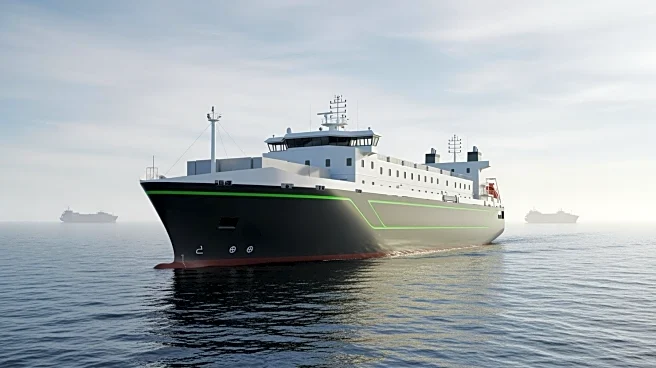What's Happening?
The United Nations shipping agency has voted to postpone a decision on implementing a global carbon price for international shipping by one year. This decision comes after intense discussions and disagreements among member countries, with significant
opposition from the United States and Saudi Arabia. The European Union and other countries like Brazil have been advocating for the shipping industry to adopt greener practices and establish a pricing mechanism for carbon emissions. However, the motion to delay was passed by a simple majority, with 57 countries in favor and 49 opposed. The International Maritime Organization (IMO) had initially planned for ships to start paying for emissions from 2028, but the timeline remains uncertain due to the lack of consensus.
Why It's Important?
The postponement of the carbon pricing decision is a setback for efforts to decarbonize the shipping industry, which is responsible for nearly 3% of global CO2 emissions. The delay affects the regulatory framework needed to encourage investment in alternative fuels and modern ships. The decision leaves the industry in uncertainty, potentially hindering progress towards reducing emissions. The U.S. opposition, led by President Trump, reflects broader resistance to international environmental regulations, impacting global trade dynamics and environmental policy. The outcome of these discussions could influence future international agreements on climate change and emissions reduction.
What's Next?
The IMO will revisit the carbon pricing decision next year, with ongoing debates expected among member countries. Stakeholders in the shipping industry, including companies like Maersk, are awaiting further developments to understand how the regulatory framework will evolve. The delay may prompt countries and companies to explore alternative strategies for emissions reduction independently. The broader implications for international trade and environmental policy will continue to unfold as countries reassess their positions and negotiate terms.
Beyond the Headlines
The decision to delay carbon pricing highlights the complex interplay between environmental goals and economic interests. The resistance from major oil producers like the U.S. and Saudi Arabia underscores the challenges in balancing economic growth with environmental sustainability. The shipping industry's reliance on fossil fuels and the global nature of trade complicate efforts to implement uniform environmental policies. This situation may lead to increased scrutiny of the IMO's role in regulating international shipping and its effectiveness in addressing climate change.















